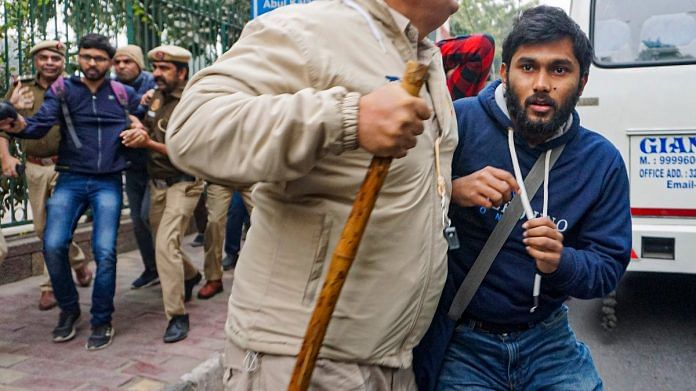New Delhi: A leftist students’ body in Delhi’s Jamia Millia Islamia cancelled plans Wednesday to screen a controversial BBC documentary on Prime Minister Narendra Modi after a crackdown by university authorities and the police saw 13 youngsters detained.
The screening of “India: The Modi Question”, scheduled for 6 pm on the campus, was called off in the face of a massive police build-up outside the institute.
Students alleged that four members of the Students Federation of India – affiliated to the Communist Party of India (Marxists) – were manhandled by the university proctor early on Wednesday.
One of them told ThePrint, “It’s acceptable if the university comes and speaks with us but it is not okay if they start manhandling women students.”
Following that alleged incident, the students called for a protest at 4.30 pm. Around 3 pm, however, the university gates shuttered and students could neither enter nor exit. The canteen and library were also closed in the middle of the day, some students claimed.
As the day progressed, four students of Congress’ National Students’ Union of India came out of the gates shouting slogans and were immediately detained.
Deputy Commissioner of Police, South, Esha Pandey said the students were detained around 4 pm after they created a ruckus on the street outside the university.
Incidentally, the university said in a statement Tuesday: “It has come to the knowledge of the university administration that some students belonging to a political organisation (SFI) have circulated a poster about screening of a controversial documentary film on the university campus today.”
“The university administration has earlier issued a memorandum/circular and once again reiterates that no meeting/gathering of students or screening of any film shall be allowed in the campus without the permission of the competent authority, failing which strict disciplinary action shall be taken against the organisers,” the statement read.
It further said, “The university is taking all possible measures to prevent people/organisations having vested interest to destroy the peaceful academic atmosphere of the university.”
A second-year student of media studies Vishnu told ThePrint: “I would have gone had the screening been held. It is my opinion that the government cannot tell students what to watch and what not to watch.”
His friend, who was speaking to a television channel, was also detained by the police for allegedly talking to the media. Students, who were inside the campus since morning, said they were forced to vacate by 5 pm.
On Tuesday evening, several students in the Jawaharlal Nehru University apparently watched the documentary on their mobiles on campus, after electricity and internet connections suddenly died in the students’ union office where the screening was proposed. They said stones were thrown at them by unknown assailants. However, a similar screening held at the University of Hyderabad did not face any such disturbance.
Students say will watch
Jamia student Waqar said some of them had watched the documentary — which makes controversial observations about the 2002 Gujarat riots — on their personal devices. “Students are watching it and the sole reason why we want it to be screened is because we want our community to know what kind of things should not be promoted,” he said.
He added: “One thing that is significant is how law and order can be so easily controlled and misused by political powers. It also shows how they are using their power to gain more votes and not provide benefits to people, like education and employment.”
Undergraduate Sakhi said that watching the documentary would have benefitted students, adding, “I was born after 2002… this could have been a great source of credible information for me. It would have been a beneficial source of information for a lot of us born after the riots.”
She said students will watch the documentary in their personal space.
The government last Friday directed social media platforms Twitter and YouTube to block all links to the BBC documentary. The Ministry of External Affairs called it a “propaganda piece”.
The two-part documentary claims it investigated certain aspects related to the 2002 Gujarat riots when Narendra Modi was chief minister. The documentary has not been screened in India.
Also read: Jamia University administration warns students against screening BBC documentary on campus



